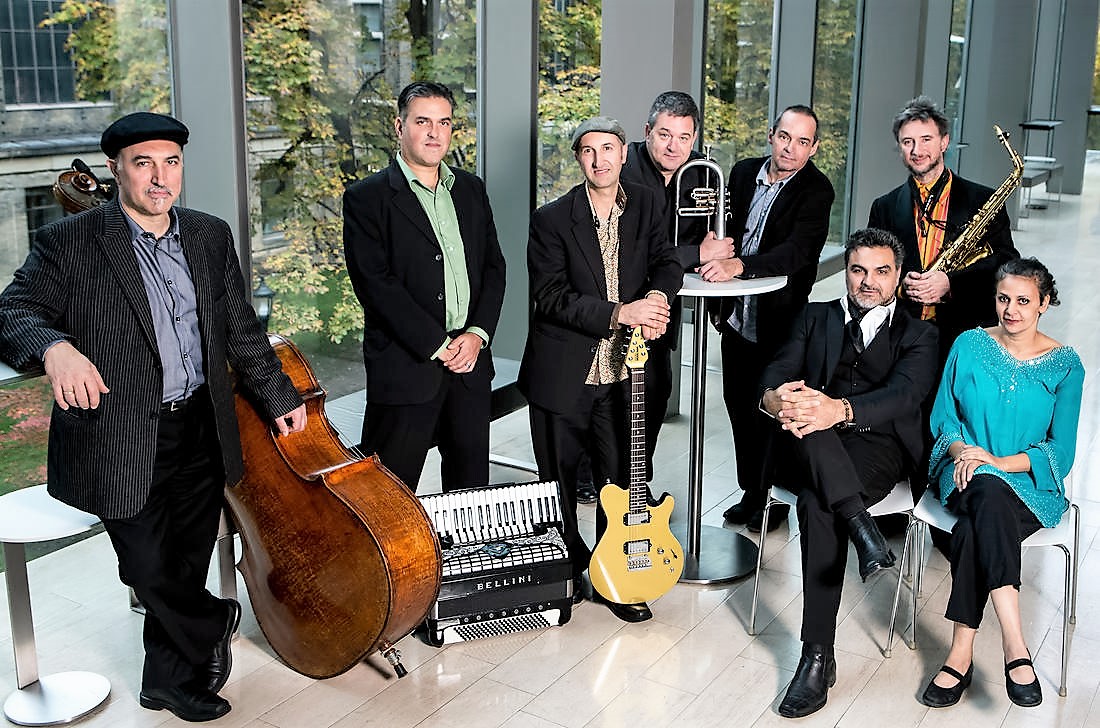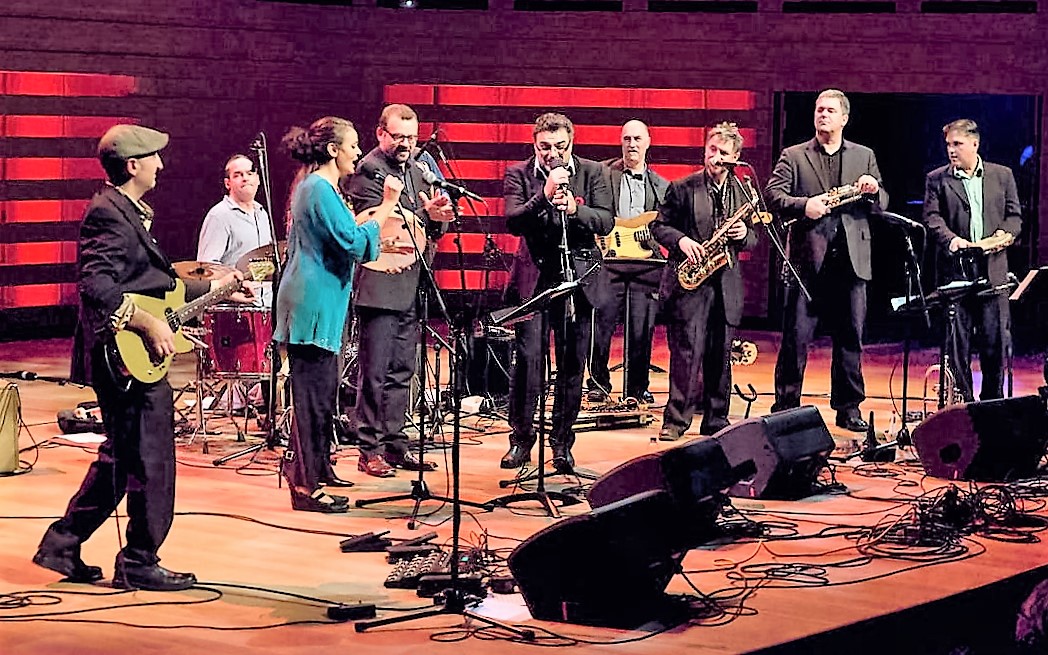Michael Occhipinti’s band, the Sicilian Jazz Project, debuted in 2008 with an album that impressed critics and listeners with its boldly original fusion of traditional Sicilian songs and other genres — mainly jazz, but also blues, West African, funk, and chamber music. Eight years later, the Toronto-based band, rechristened as the Sicilian Project, has returned with a new album that not only fulfills the promise of their debut but even surpasses it. Muorica, a mix of traditional songs, material by well-known Sicilian songwriters, and original compositions, represents one of the finest cultural expressions ever to emerge from the North American Italian diaspora.
Not since the Sicilian-American saxophonist Joe Lovano’s album Viva Caruso! (2002), and Lovano compositions such as “Miss Etna” and “Bread and Wine,” has an Italian-descended musician made such a happy marriage of ethnic roots and jazz improvisation.
Occhipinti, 48, a guitarist, and his brother and co-producer Roberto, 60, a bassist, front a septet that comprises accordionist Louis Simao, saxophonist/flutist Ernie Tollar, trumpeter Kevin Turcotte, drummer Mark Kelso, and vocalist Dominic Mancuso. On Muorica, they’re joined by the American clarinetist Don Byron and four singers, Maryem and Yvette Tollar, Francesco Pellegrino, and, from Italy, Pilar (nome d’arte of Illaria Patassini). With the exception of Kelso, who replaces the band’s original drummer Barry Romberg, the lineup is the same as on the first album. They’re all first-rate —Turcotte was recruited to play Chet Baker’s solos in “Born to Be Blue,” the new Ethan Hawke biopic about the late trumpeter— but it’s Michael Occhipinti’s vision and wide-ranging musical imagination that makes the Sicilian Project so distinctive.
Muorica takes its title from the Sicilian spelling of Modica, the city in eastern Sicily from which the Occhipinti brothers’ parents emigrated to Canada in the early 1950s. In 2010, Michael, his wife, and their children spent four months in Pozzallo, a port city near Modica, their sojourn funded by a Chalmers Arts fellowship from the Ontario Arts Council. He says that the first Sicilian (Jazz) Project album explored Sicilian music “from a distance.” For its follow-up, “I wanted to immerse myself in the culture more, and the fellowship enabled me to do that. I met up with songwriters, poets, other musicians, who were fascinated that there was this Canadian guy, albeit of Sicilian roots, trying to preserve the music and do something different with it. They were really helpful and gave me a lot of material. I came back with a whole host of stories, poetry, songs, recordings—to be honest, it was so much material I had to live with it for a while, just take a deep breath and then dive in to it. So it took a while to start actually composing and arranging the music that ended up on the record.”
Occhipinti’s first Sicilian album drew on folk songs that the American musicologist Alan Lomax and his Italian associate Diego Carpitella recorded in Sicily in 1954. “That was just after my parents left,” he remarks. “My Dad left in ’52, then my Mom and my two oldest siblings in ‘53. Lomax even went to Modica. I was intrigued by the fact that he recorded in the place they’d just left.” While Occhipinti was in Sicily, “A lot of things fell into my lap. I went to a poetry night. This poet friend of mine was launching his new book, so what do they do – they rent out a place and have a huge meal and everybody goes. They have the meal, and then they do readings from the book, and then spontaneous readings by other poets. That’s where I met Franca Cavallo, who had written a beautiful poem about the city that my parents are from, which became the title track of the record.”
Muorica’s traditional songs include “Cantu a Timuni,” sung beautifully by Francesco Pellegrino; “Cialomi,” a fishing chant from Sciacca recorded by Lomax in 1954; “Spunta Lu Sole,” which Occhipinti found while doing research at the Museo delle Marionette in Palermo; and “’A Staciuni,” an old song from Modica about the changing of the seasons. Occhipinti and the band interpret “Pirati a Palermo,” by the great folk singer Rosa Balestreri (with words by the poet Ignazio Buttitta); Nono Salamone’s tragicomic “Favi Amari,” in a reggae arrangement with a passionate vocal by Dominic Mancuso; and “Sacciu Chi Parla a La Luna,” one of the best-known pieces by the marvelous Sicilian duo, Fratelli Mancuso (no relation to the Sicilian Project’s lead vocalist).
Occhipinti set to music Ignazio Buttitta’s famous poem “Lingua e Dialettu,” in two parts, “Poesia” and “Cantu.” Composed for the 2014 Ottawa Chamberfest, the piece opens with the sound of pealing church bells, followed by Pilar’s recitation of Buttitta’s verse, accompanied by the Cecilia String Quartet. On “Cantu,” Pilar, backed by the band and the string quartet, delivers a gorgeous vocal that seamlessly merges jazz and Sicilian influences. In “The Solider and the Siren,” written by Occhipinti and Pilar, a woman in Modica observes Canadian troops marching in her town after its liberation during World War II. Disturbed by a premonition of the terrible casualties they will face when they land on the Italian mainland, she wishes she could change their fate, and that of one soldier in particular. With a brilliant arrangement by Occhipinti, superb playing by the band, and another extraordinary vocal by Pilar, it’s a moving, emotionally intense performance. Occhipinti’s “Marzemi,” an instrumental that is the album’s most straightforwardly jazz track, is based on a 16-bar call and response theme, with gripping solos by Turcotte, Kelso, and Occhipinti, a remarkable guitarist, in both technique and genre-crossing versatility.
My favorite of Occhipinti’s compositions, however, is the opening track, “Amuninni Razzietta” (Let’s Go, Razzietta). Opening with a banjo pattern that recurs throughout the piece, it was inspired by “the guitar-driven music of Mali” and the African funk of Nigerian drummer Tony Allen. The Sicilian lyrics —the first Occhipinti has written in the language — draw on “a conversation I heard my parents have many times.” After working hard all week at his construction company, Occhipinti’s father wanted to spend his weekends relaxing at home. But his mother Graziella, known as Razzietta to her friends, wanted to go out dancing after a week of domestic labors. Her persistence overcame the objections of her husband, who’d say, “OK, get dressed, we’re going out.” The song captures the joyful release Occhipinti’s mother must have felt when she got the chance to go out and kick up her heels on the dancefloor.

“I was born in Canada but my parents still spoke dialect at home,” Occhipinti says. “I’m fluent in their dialect, albeit with an American accent. Which I think puts me in an interesting spot. The dialect has evolved in Sicily itself. It’s not that Sicilians don’t sound like Sicilians anymore, but the dialect changes. When I’m there, and I speak the way my parents spoke, people say to me, ‘Did you step out of a time machine, where did you learn to speak like that because you sound like my great-grandfather, except you have a North American accent’— which really throws them for a loop. It was amazing how many people asked me if I was born in Sicily and emigrated, and then came back, and I’d say, ‘No, I learned it in Toronto!”
“It’s not really something I can pass onto my kids,” he adds. “I’m not going to teach them a dialect nobody speaks anymore. So my brothers, my sisters, and I know we’re in possession of this unique gift. I have to say that when we play the repertoire live, it means a lot to me. My parents have passed away, so when I hear those words I feel this connection.”
Occhipinti says that the Sicilian Project merges the sounds of Sicily and his own eclectic musical taste, which he developed in Toronto. “Living in a big city in North America, you get exposed to a lot of different music. Toronto is very multicultural and I’ve always taken it for granted that I would play music from other cultures. So it was nice to look at Sicilian music from that point of view. When I arrange it, I approach it that way, trying to mix all the different things I like together. I’m not a folk musician, I’m not trying to authentically replicate what folk groups do. There are folk groups that do that very well. I’m an improvising musician, coming from a jazz background. So I’m not really interested in preserving it so much as in transforming it into something my own.”
But if Occhipinti hadn’t heard the field recordings that Alan Lomax made in Sicily, there might never have been a Sicilian Project. “When I was studying at university,” he continues, “I was happy to play any kind of music. But the one music I never wanted to explore was Italian music, because my own ideas of it were really small. It was like, oh, that’s what I hear at the weddings my parents drag me to. So it was great to hear those Lomax recordings and realize there was this whole other deep stuff, and that the stuff they play at weddings is just one little part of it.”
Though he lives with his family in Toronto, Occhipinti cherishes his ties to his parents’ homeland. In 2009, a year before he moved to Pozzallo to research the material that would become Muorica, he and his brother Roberto received the Ragusani nel Mondo prize, which recognizes achievement in different fields by people who trace their roots to the province of Ragusa. He says the award “recognized the fact that we’re trying to spread some Sicilian culture in a way that treats it like an art music, or a populist art music.”

“What I found in Sicily was that there was this kind of split, there were folk musicians who generally were amateurs interested in preserving the folk traditions, doing it for love although some make a living at it, and there are the contemporary musicians, who want to play pop music or jazz but they don’t want to ‘contaminate’ the jazz or pop with folk music. So I’d often have musicians who’d find out what I was up to and would say, ‘You know, I hate folk music, but I like what you’re doing.’ One thing I feel is that maybe by being away from Sicily, I’m not burdened with having to preserve the music. I’m not really worried about whether I do it authentically and that’s liberating. It’s true of any music, of jazz or blues – any time people worry too much about whether it’s authentic or whether they’re preserving it, then it tends to be less creative than in the hands of people who are willing to combine it with other things. That’s how music evolves.”
Michael Occhipinti, a musical polymath, is involved with a diverse range of projects that have included a big band; chamber music; and albums featuring the music of two renowned songwriters, John Lennon and Canada’s Bruce Cockburn. He’s composed for other ensembles, and also teaches at the Royal Conservatory of Music. With a group of Toronto musicians, he’s currently collaborating on “Songs and Sounds of a Lost Toronto Neighborhood,” a project featuring music from the African-Canadian, Jewish, and Italian communities that once lived in a part of the city known as The Ward. But he says the Sicilian Project “obviously” has a particular significance for him.
“There’s a part of my brain that only fires when I’m speaking Sicilian or playing that music,” he says. “A whole personal part gets to come out.”
Visit www.michaelocchipintimusic.com to purchase Muorica (The CD comes with a full-color booklet that describes the stories behind the songs.) It also is available from I-Tunes and Google Play.











